Françoise Rosay (1891-1974) was the grand old lady of the French cinema. Her most famous films were La kermesse heroïque (1935) and Pension Mimosas (1936), both directed by her husband, Jacques Feyder.
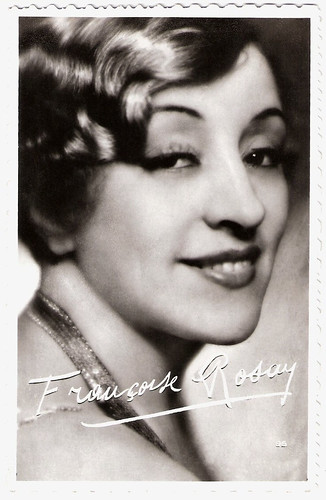
French postcard, early 1930s.
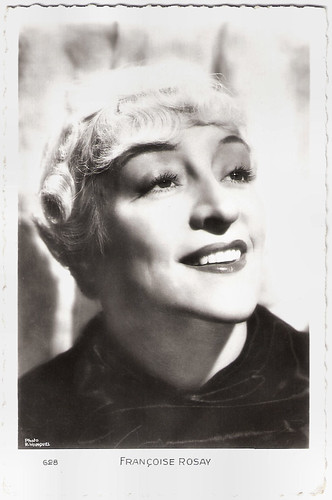
French postcard by Ed. Chantal, Paris, no. 628. Photo: R. Voinquel.
Françoise Rosay was born Françoise Bandy de Nalèche in Paris in 1891 as the illegitimate daughter of the actress Marie-Thérèse Chauvin, aka Sylviac, and count François Louis Bandy de Nalèche. Her father only recognised her in 1938. She originally planned to become an opera singer, and in 1917, won a prize at the Paris Conservatoire and made her debut at the Palais Garnier in the title role of Salammbô by Ernest Reyer. She also sang in Castor et Pollux by Rameau and Thaïs by Massenet.
In 1911 Rosay had her first screen performance in an adaptation of William Shakespeare's Falstaff by Henri Desfontaines. Only a few films followed in the next years, including a bit part in the cult serial Les Vampires/The Vampires (Louis Feuillade, 1916).
The tide radically changed in 1917 when she married film director Jacques Feyder. In the late 1910s she played in various shorts by him and from 1921 to 1941 Rosay played in almost all important films by Feyder. In the touching melodrama Gribiche/Mother of Mine (Jacques Feyder, 1926), she had her first lead as a rich American woman who adopts a Parisian working-class boy (Jean Forest).
Next followed the Franco-German coproduction Le bateau de verre/The Glass Boat (Constantin David, Jacqueline Milliet, 1927) with André Nox, Madame Recamier (Tony Lekain, Gaston Ravel, 1928) opposite Marie Bell, and the comedy Les deux timides/Two Timid Souls (René Clair, 1928).
In the late 1920s and early 1930s, the Feyder-Rosay family resided in Hollywood, where Feyder shot The Kiss (1929) and the German version of Anna Christie (1931) both with Greta Garbo, and Daybreak (1931) and Son of India (1931) both with Ramon Novarro. Rosay played Marceline Day’s mother in the orientalist romance The One Woman Idea (Berthold Viertel, 1929).
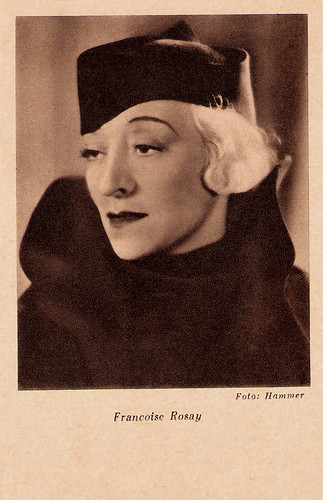
German postcard by Das Programm von Heute, Berlin. Photo: Hammer.
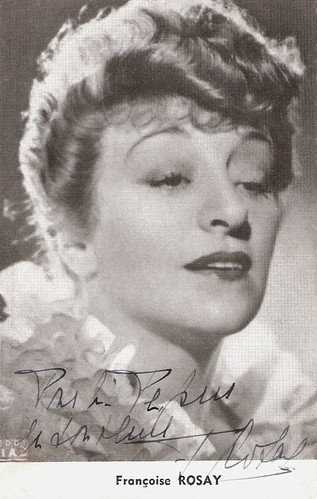
French postcard, 1940 Photo: Teddy Piaz.
When sound film set in, Françoise Rosay played in various French and German versions of American films by MGM and Paramount, intended for the European market. These included Soyons gais (Arthur Robison, 1930) - the French version of Let Us Be Gay (Robert Z. Leonard, 1930) in which she replaced Norma Shearer, Le procès de Mary Dugan (Marcel de Sano, 1930) - the French version of The Trial of Mary Dugan (Bayard Veiller, 1929), and Si l’empereur savait ça (Jacques Feyder, 1930) - the French version of His Glorious Night (Lionel Barrymore, 1929).
She also had a part in the German and the French version of the Buster Keaton sound comedy Parlor, Bedroom and Bath (Edward Sedgwick, 1931), called Casanova wider Willen (Edward Brophy, 1931) and Buster se marie (Claude Autant-Lara, Edward Brophy, 1931).
At Paramount, Rosay played in the mélo The Magnificent Lie (Berthold Viertel, 1931), in which she was a French actress who becomes the idol of a blinded soldier (Ralph Bellamy), who is tricked in believing that a saucy music-hall singer (Ruth Chatterton) is the actress.
Other French versions of American films were La chance/Luck (René Guissart, 1931) starring Marie Bell, Le petit café/The Little Café (Ludwig Berger, 1931) opposite Maurice Chevalier, and Quand on est belle/When She's Pretty (Arthur Robison, 1932) with Lily Damita.
Back in France, Rosay had an intense career in French cinema of the 1930s. She was Madame Husson in the Guy de Maupassant adaptation Le Rosier de Madame Husson/Mrs. Husson's Virginity Prize (Dominique Bernard-Deschamps, 1932), followed by Coralie et Cie/Coralie and Company (Alberto Cavalcanti, 1933), La pouponnière/The nursery (Jean Boyer, 1933), and Vers l’abîme/Towards the abyss (Hans Steinhoff, Serge Véber, 1934). She also played in the German version of Vers l’abîme, Die Insel (Hans Steinhoff, 1934). In 1934 Rosay also had a small part as bar owner in Feyder’s Le grand jeu/The Great Game (Jacques Feyder, 1934), starring Marie Bell and Pierre Richard-Willm.
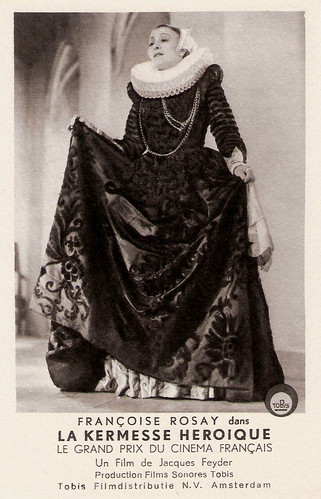
Dutch postcard by Tobis filmdistributie N.V. Amsterdam. Photo: Tobis. Publicity still for La Kermesse Heroique (1935). Collection: Egbert Barten.
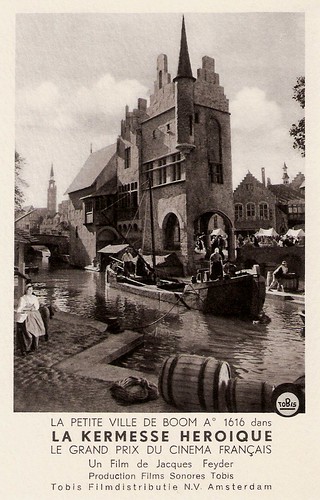
Dutch postcard by Tobis filmdistributie N.V. Amsterdam. Photo: Tobis. Publicity still for La Kermesse Heroique (1935). Collection: Egbert Barten.
In 1935 Françoise Rosay played her most famous part, that of the clever wife of a Flemish mayor whose city is invaded by the Spanish army. In Feyder’s film La kermesse heroïque/Carnival in Flanders (Jacques Feyder, 1936), all local men cowardly hide, while the women stay. They conquer the foreigners with their wit and charm and eventually make them go away. Right-wing nationalists in Holland, Flanders, and elsewhere were not very happy with the film. Rosay also played in the German version, Die klugen Frauen/The Smart Women (Jacques Feyder, 1936).
Immediately after this film, Rosay played another memorable part, that of the pension keeper Louise Noblet in the contemporary drama Pension Mimosas (Jacques Feyder, 1936). Louise and her man foster a boy whose father is in prison. Once grown up, the godson (Paul Bernard) has become as delinquent as his father was, but Louise still helps him until affairs run out of hand.
Rosay had the title role in Marcel Carné’s film Jenny (Marcel Carné, 1936) with Albert Préjean, typical for the poetic realism in French cinema of the late 1930s. Rosay plays a madam who doesn’t want her daughter to know.
Until the war Rosay prolonged her highly active career with The Robber Symphony (Friedrich Feher, 1937) with Magda Sonja, Un carnet de bal/Christine (Julien Duvivier, 1937), Drôle de drame/Bizarre, Bizarre (Marcel Carné, 1937) with Louis Jouvet, Les gens du voyage/People Who Travel (Jacques Feyder, 1938) and Feyder's German version Fahrendes Volk (Jacques Feyder, 1938).
Next to Fahrendes Volk, Rosay also played in three other German films: Die letzten Vier von Santa Cruz/The Last Four of Santa Cruz (Werner Kingler, 1935) shot at the Canarian Islands, Mein Sohn, der Herr Minister/My Son the Minister (Veit Harlan, 1937) with Hans Brausewetter, and Die Hochzeitsreise/The Wedding Journey (Karl Ritter, 1939).
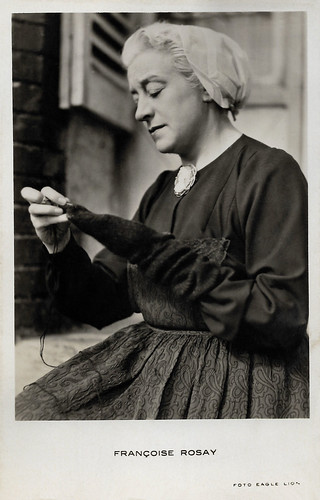
Dutch postcard by HEMO. Photo: Eagle Lion. Françoise Rosay in Johnny Frenchman (Charles Frend, 1945).
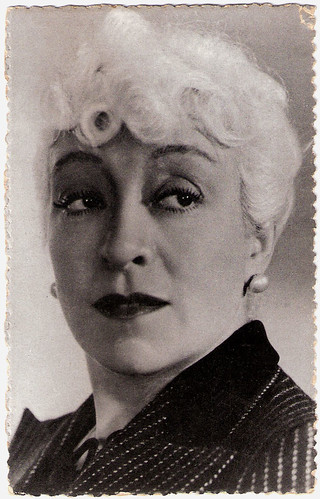
Belgian postcard by Nels for Kwatta. Photo: M.B. Films.
Strikingly Françoise Rosay played her most famous parts in her forties and not in her twenties, contradicting the cliché about the lack of interesting parts for older actresses.
During the German occupation of France, Rosay first worked for the resistance while still acting. Then she had a narrow escape when the Germans invaded the south in 1942. She rejoined her husband in Switzerland, where Rosay taught at the Conservatoire de Genève (Conservatory of Geneva) and worked for an antifascist radio station.
Her French comeback was with the female lead in Feyder’s criminal drama Macadam (Jacques Feyder, Marcel Blistène, 1946) with Simone Signoret. It would be their last professional collaboration, because Feyder died in 1948. Rosay was devastated but kept on working.
Until her death Rosay continued to play leads but also smaller parts in French, Italian, British and American films. These include Saraband for Dead Lovers (Basil Dearden, 1948), Donne senza nome/Women Without Names (Geza von Radvanyi, 1950) starring Simone Simon, the crime comedy L’auberge rouge/The Red Inn (Claude Autant-Lara, 1951) with Fernandel, La reine Margot/A Woman of Evil (Jean Dréville, 1954) featuring Jeanne Moreau, and Interlude (Douglas Sirk, 1957) with June Allyson and Rossano Brazzi.
In 1969 the 'grand old lady of French cinema' was awarded a lifetime award as best actress, the Etoile du Crystal. Her memoirs were published as La traversée d'une vie in 1974. That same year Françoise Rosay died at the age of 82 in Montgeron, France.
Her final film was Der Fußgänger/The Pedestrian (Maximilian Schell, 1974), which was nominated for an Academy Award and won the Golden Globe for Best Foreign-Language Film of 1974. Rosay and Feyder had three sons: Marc, Paul and actor/producer Bernard, who appeared in films as Bernard Farrel.
French trailer for L’auberge rouge (1951). Source: sansdomicileconnu (YouTube).
Sources: Caroline Hanotte (CinéArtistes - French), Wikipedia (English, German and French), and IMDb.

French postcard, early 1930s.

French postcard by Ed. Chantal, Paris, no. 628. Photo: R. Voinquel.
Hollywood
Françoise Rosay was born Françoise Bandy de Nalèche in Paris in 1891 as the illegitimate daughter of the actress Marie-Thérèse Chauvin, aka Sylviac, and count François Louis Bandy de Nalèche. Her father only recognised her in 1938. She originally planned to become an opera singer, and in 1917, won a prize at the Paris Conservatoire and made her debut at the Palais Garnier in the title role of Salammbô by Ernest Reyer. She also sang in Castor et Pollux by Rameau and Thaïs by Massenet.
In 1911 Rosay had her first screen performance in an adaptation of William Shakespeare's Falstaff by Henri Desfontaines. Only a few films followed in the next years, including a bit part in the cult serial Les Vampires/The Vampires (Louis Feuillade, 1916).
The tide radically changed in 1917 when she married film director Jacques Feyder. In the late 1910s she played in various shorts by him and from 1921 to 1941 Rosay played in almost all important films by Feyder. In the touching melodrama Gribiche/Mother of Mine (Jacques Feyder, 1926), she had her first lead as a rich American woman who adopts a Parisian working-class boy (Jean Forest).
Next followed the Franco-German coproduction Le bateau de verre/The Glass Boat (Constantin David, Jacqueline Milliet, 1927) with André Nox, Madame Recamier (Tony Lekain, Gaston Ravel, 1928) opposite Marie Bell, and the comedy Les deux timides/Two Timid Souls (René Clair, 1928).
In the late 1920s and early 1930s, the Feyder-Rosay family resided in Hollywood, where Feyder shot The Kiss (1929) and the German version of Anna Christie (1931) both with Greta Garbo, and Daybreak (1931) and Son of India (1931) both with Ramon Novarro. Rosay played Marceline Day’s mother in the orientalist romance The One Woman Idea (Berthold Viertel, 1929).

German postcard by Das Programm von Heute, Berlin. Photo: Hammer.

French postcard, 1940 Photo: Teddy Piaz.
Intense Career in French Cinema
When sound film set in, Françoise Rosay played in various French and German versions of American films by MGM and Paramount, intended for the European market. These included Soyons gais (Arthur Robison, 1930) - the French version of Let Us Be Gay (Robert Z. Leonard, 1930) in which she replaced Norma Shearer, Le procès de Mary Dugan (Marcel de Sano, 1930) - the French version of The Trial of Mary Dugan (Bayard Veiller, 1929), and Si l’empereur savait ça (Jacques Feyder, 1930) - the French version of His Glorious Night (Lionel Barrymore, 1929).
She also had a part in the German and the French version of the Buster Keaton sound comedy Parlor, Bedroom and Bath (Edward Sedgwick, 1931), called Casanova wider Willen (Edward Brophy, 1931) and Buster se marie (Claude Autant-Lara, Edward Brophy, 1931).
At Paramount, Rosay played in the mélo The Magnificent Lie (Berthold Viertel, 1931), in which she was a French actress who becomes the idol of a blinded soldier (Ralph Bellamy), who is tricked in believing that a saucy music-hall singer (Ruth Chatterton) is the actress.
Other French versions of American films were La chance/Luck (René Guissart, 1931) starring Marie Bell, Le petit café/The Little Café (Ludwig Berger, 1931) opposite Maurice Chevalier, and Quand on est belle/When She's Pretty (Arthur Robison, 1932) with Lily Damita.
Back in France, Rosay had an intense career in French cinema of the 1930s. She was Madame Husson in the Guy de Maupassant adaptation Le Rosier de Madame Husson/Mrs. Husson's Virginity Prize (Dominique Bernard-Deschamps, 1932), followed by Coralie et Cie/Coralie and Company (Alberto Cavalcanti, 1933), La pouponnière/The nursery (Jean Boyer, 1933), and Vers l’abîme/Towards the abyss (Hans Steinhoff, Serge Véber, 1934). She also played in the German version of Vers l’abîme, Die Insel (Hans Steinhoff, 1934). In 1934 Rosay also had a small part as bar owner in Feyder’s Le grand jeu/The Great Game (Jacques Feyder, 1934), starring Marie Bell and Pierre Richard-Willm.

Dutch postcard by Tobis filmdistributie N.V. Amsterdam. Photo: Tobis. Publicity still for La Kermesse Heroique (1935). Collection: Egbert Barten.

Dutch postcard by Tobis filmdistributie N.V. Amsterdam. Photo: Tobis. Publicity still for La Kermesse Heroique (1935). Collection: Egbert Barten.
Poetic Realism
In 1935 Françoise Rosay played her most famous part, that of the clever wife of a Flemish mayor whose city is invaded by the Spanish army. In Feyder’s film La kermesse heroïque/Carnival in Flanders (Jacques Feyder, 1936), all local men cowardly hide, while the women stay. They conquer the foreigners with their wit and charm and eventually make them go away. Right-wing nationalists in Holland, Flanders, and elsewhere were not very happy with the film. Rosay also played in the German version, Die klugen Frauen/The Smart Women (Jacques Feyder, 1936).
Immediately after this film, Rosay played another memorable part, that of the pension keeper Louise Noblet in the contemporary drama Pension Mimosas (Jacques Feyder, 1936). Louise and her man foster a boy whose father is in prison. Once grown up, the godson (Paul Bernard) has become as delinquent as his father was, but Louise still helps him until affairs run out of hand.
Rosay had the title role in Marcel Carné’s film Jenny (Marcel Carné, 1936) with Albert Préjean, typical for the poetic realism in French cinema of the late 1930s. Rosay plays a madam who doesn’t want her daughter to know.
Until the war Rosay prolonged her highly active career with The Robber Symphony (Friedrich Feher, 1937) with Magda Sonja, Un carnet de bal/Christine (Julien Duvivier, 1937), Drôle de drame/Bizarre, Bizarre (Marcel Carné, 1937) with Louis Jouvet, Les gens du voyage/People Who Travel (Jacques Feyder, 1938) and Feyder's German version Fahrendes Volk (Jacques Feyder, 1938).
Next to Fahrendes Volk, Rosay also played in three other German films: Die letzten Vier von Santa Cruz/The Last Four of Santa Cruz (Werner Kingler, 1935) shot at the Canarian Islands, Mein Sohn, der Herr Minister/My Son the Minister (Veit Harlan, 1937) with Hans Brausewetter, and Die Hochzeitsreise/The Wedding Journey (Karl Ritter, 1939).

Dutch postcard by HEMO. Photo: Eagle Lion. Françoise Rosay in Johnny Frenchman (Charles Frend, 1945).

Belgian postcard by Nels for Kwatta. Photo: M.B. Films.
Narrow Escape
Strikingly Françoise Rosay played her most famous parts in her forties and not in her twenties, contradicting the cliché about the lack of interesting parts for older actresses.
During the German occupation of France, Rosay first worked for the resistance while still acting. Then she had a narrow escape when the Germans invaded the south in 1942. She rejoined her husband in Switzerland, where Rosay taught at the Conservatoire de Genève (Conservatory of Geneva) and worked for an antifascist radio station.
Her French comeback was with the female lead in Feyder’s criminal drama Macadam (Jacques Feyder, Marcel Blistène, 1946) with Simone Signoret. It would be their last professional collaboration, because Feyder died in 1948. Rosay was devastated but kept on working.
Until her death Rosay continued to play leads but also smaller parts in French, Italian, British and American films. These include Saraband for Dead Lovers (Basil Dearden, 1948), Donne senza nome/Women Without Names (Geza von Radvanyi, 1950) starring Simone Simon, the crime comedy L’auberge rouge/The Red Inn (Claude Autant-Lara, 1951) with Fernandel, La reine Margot/A Woman of Evil (Jean Dréville, 1954) featuring Jeanne Moreau, and Interlude (Douglas Sirk, 1957) with June Allyson and Rossano Brazzi.
In 1969 the 'grand old lady of French cinema' was awarded a lifetime award as best actress, the Etoile du Crystal. Her memoirs were published as La traversée d'une vie in 1974. That same year Françoise Rosay died at the age of 82 in Montgeron, France.
Her final film was Der Fußgänger/The Pedestrian (Maximilian Schell, 1974), which was nominated for an Academy Award and won the Golden Globe for Best Foreign-Language Film of 1974. Rosay and Feyder had three sons: Marc, Paul and actor/producer Bernard, who appeared in films as Bernard Farrel.
French trailer for L’auberge rouge (1951). Source: sansdomicileconnu (YouTube).
Sources: Caroline Hanotte (CinéArtistes - French), Wikipedia (English, German and French), and IMDb.
No comments:
Post a Comment